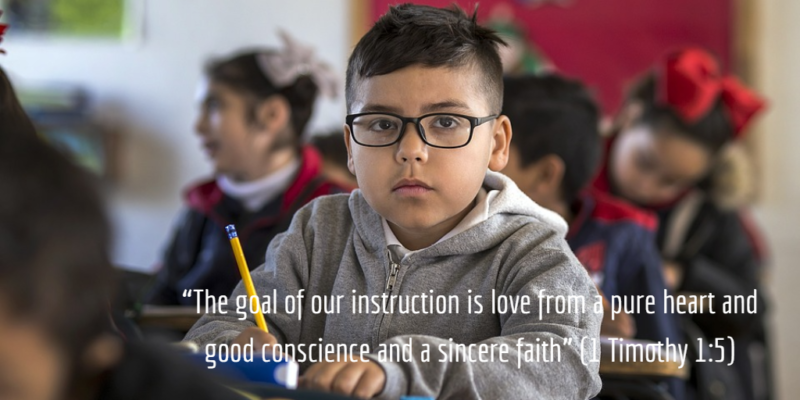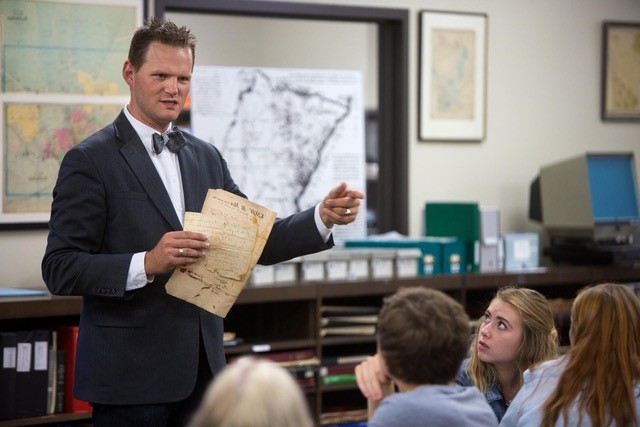Teaching only happens in a relationship of trust
Recently, Darrow led a group of thought leaders in a discussion prompted by the wide interest in School vs. Education. The group talked about producing a book treating education from a biblical worldview. One of those leaders was our friend, Dr. Elizabeth Youmans, who sat down and quickly typed her thoughts. Her paper evidences a powerful grasp of and lifetime contribution to the field of education. We are delighted to offer it here, virtually exactly as she originally wrote it. editor
My background: I was taught and discipled in the fundamentals of teaching by two masters in the Principle Approach, one of them the architect herself. When approaching any subject, we always begin by defining our terms and going into the Scriptures to gain the biblical view of the subject. We use Webster’s 1828 Dictionary and our Bible concordance for this process. (Rosalie Slater, the architect of the Principle Approach and co-founder of the Foundation for American Christian Education [FACE], is the one who discovered an original 1828 in an old bookstore 60 or 70 years ago and had it published as a facsimile. FACE remains the publisher to this day.) So, when comparing schooling versus education, we should note that neither of those words are in the Bible.
Point 1: Education is an institution, school is a building. The terms the Bible uses are teach, learn, and disciple. When I teach the subject of education, I always begin by defining education (both from Webster’s 1828 and from one of the modern dictionaries) as an institution and then go into teaching and learning, the biblical terms. Teaching and learning is first and foremost a relationship which is both internal and eternal. The goal is not the impartation of facts and information but changed lives.

Inspired teaching and learning begins in the heart-to-heart and mind-to-mind interaction that flows between the teacher and the student. The teacher must intentionally initiate a relationship that is rooted in unconditional love and acceptance. This builds trust and respect, which, in turn, unlocks the heart of the student and encourages him to give his consent to be taught. (Consent is the title deed to one’s conscience, a word that is lost to the modern Christian.) This is called discipleship, and anything else is just the dissemination and parroting back of information (“schooling”). Without consent, there is no learning! This is an internal encounter which has the potential, depending upon what is being taught, to ignite the eternal inspiration and revelation of the Holy Spirit (Job 32:8), the Spirit of truth and our Teacher (John 14:26; 15:26; 16:13). Renewed thinking and transformation begin in the heart, the seat of man’s thinking and reasoning. In fact, all change begins in the heart.
The Old Testament has many Hebrew words for teach and learn, all tied to the tools used by a shepherd. The Hebrew root is lamad. The Anglo-Saxon words are teach and learn. In the ancient Hebrew culture, the teacher had not taught if the student had not learned. The teacher or rabbi’s role was to impart the truth of God’s Word by establishing a nurturing relationship, and the student’s role was to engage himself in the discipleship process. All teaching and learning were ultimately found in the fear of the Lord. To gain understanding involves a personal encounter and response to God’s revelation, which is the central dynamic found in Scripture. Interestingly, one of the definitions for “learn” is to teach. Therefore, one who has actually learned is able to teach another.

In his first letter to Timothy, the apostle Paul exhorted his protégé to beware of men teaching false doctrines and myths. Then he wrote, “The goal of our instruction is love from a pure heart and good conscience and a sincere faith” (1 Timothy 1:5). All the qualities in Paul’s exhortation pertain to heart realities. God made the mind to serve the heart. All teaching and discipleship should be aimed at the heart. Personal encounter demands an educational methodology that includes reflective teaching and guided reasoning. In this way the Holy Spirit, the Spirit of truth, is given preeminence as Teacher to unveil truth and inspire understanding (John 14:16-26).
Point 2: All education produces a specific character. Most Christians lack an understanding of how character forms, which is why Christian schools are not graduating students who demonstrate Christian character and self-government. Jesus taught us that, “a pupil is not above his teacher, for everyone after he is fully trained, will be like his teacher” (Luke 6:40).
Point 3: American Christian teachers do not know God’s hand in the history of America (which began at creation)! They don’t know what they’ve been robbed of! (Until Scott Allen started digging into the history of the Frankfurt School, I lacked this piece in my understanding as well.) Each American Christian teacher needs to understand that he or she is in a spiritual war of ideas and to know how to gain the victory. The need is to get to the root cause of our degeneracy.
Point 4: All knowledge forms a unity of truth. Most of what happens in classrooms today is fragmented and disjointed. Disciplines/subjects are broken into little units, and the student finds no relevance in learning bits and snatches of subjects. The inspired teacher plugs his topic into the great metanarrative and teaches it from a wholistic view of knowledge.
Point 5: The Bible places the responsibility for the education of children on parents. Many in the Church do not know or understand this. School teachers, coaches, mentors, Sunday school instructors all serve parents in their divine mandate for the education of their children. Parents are not consulted for major educational decisions, etc., so the wrong people are making choices for our youth that affect all of life and our nation!
Point 6: In general, in this age of electronics and online courses, there is a sore lack of actual teaching. Students are placed in front of computers and interact with screens.
Point 7: Christian teachers have received their degrees in secular universities under Marxist professors (often) learning secular educational philosophies and methods. When they arrive in the classroom to teach, they use secular textbooks. They do not know God as the author of their disciplines. Our Christian colleges, seminaries, and universities are not much better. There is a famine of God’s Word and, therefore, of biblical, Christian scholarship.
To educate the children of today is to construct the foundation of the nation tomorrow. Faithless teaching makes for unfaithful citizens. … To save our country from the dry rot of secularism we are in need of a nation-wide education that honors God and that teaches study content in light of God’s Word. Dr. Mark Fakkema. Teaching and Learning America’s Christian History: The Principle Approach, (1965), Foreword.
Point 8: There is a lack of commitment to disciple and mentor youth in the Church. It takes a village! Our adult generation in the Church needs a re-education.
- Elizbeth Youmans







2 Comments
john allcott
June 18, 2018 - 4:43 pmSome conservatives will have a knee-jerk reaction to “It takes a village!”
Of course this is because Hillary Clinton hijacked the phrase many years ago.
However, what Clinton actually meant was “It takes Big Government!”
She has no idea what a village working together is really like.
admin
June 20, 2018 - 11:49 amJohn, thanks for reading and for your comment. Hope you find these blogs useful and encouraging.